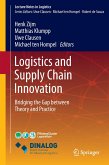This contributed volume contains research papers presented at the 4th International Conference on Dynamics in Logistics, held in Bremen, Germany, February 2014. The conference is concerned with the identification, analysis and description of the dynamics of logistic processes and networks. The spectrum reaches from the modeling and planning of processes over innovative methods like autonomous control and knowledge management to the new technologies provided by radio frequency identification, mobile communication, and networking. The growing dynamic confronts the area of logistics with completely new challenges: it must become possible to rapidly and flexibly adapt logistic processes and networks to continuously changing conditions. The book primarily addresses researchers and practitioners from the field of logistics, but it may also be beneficial for graduate students.
This contributed volume brings together research papers presented at the 4th International Conference on Dynamics in Logistics, held in Bremen, Germany in February 2014. The conference focused on the identification, analysis and description of the dynamics of logistics processes and networks. Topics covered range from the modeling and planning of processes, to innovative methods like autonomous control and knowledge management, to the latest technologies provided by radio frequency identification, mobile communication, and networking. The growing dynamic poses wholly new challenges: logistics processes and networks must be(come) able to rapidly and flexibly adapt to constantly changing conditions. The book primarily addresses the needs of researchers and practitioners from the field of logistics, but will also be beneficial for graduate students.
This contributed volume brings together research papers presented at the 4th International Conference on Dynamics in Logistics, held in Bremen, Germany in February 2014. The conference focused on the identification, analysis and description of the dynamics of logistics processes and networks. Topics covered range from the modeling and planning of processes, to innovative methods like autonomous control and knowledge management, to the latest technologies provided by radio frequency identification, mobile communication, and networking. The growing dynamic poses wholly new challenges: logistics processes and networks must be(come) able to rapidly and flexibly adapt to constantly changing conditions. The book primarily addresses the needs of researchers and practitioners from the field of logistics, but will also be beneficial for graduate students.








